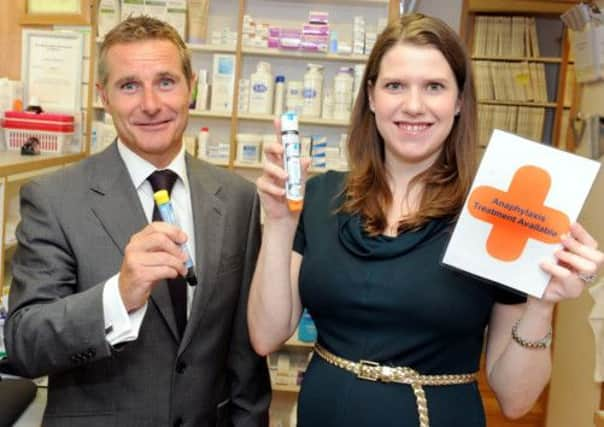High street help now available for allergies


Anaphylaxsis received mainstream media attention earlier this year when Liberal Democrat MP Jo Swinson suffered a serious reaction after inadvertently eating a biscuit containing nuts. The swift medical attention she received averted a potentially life-threatening outcome.
This summer, community pharmacies across Scotland began a campaign to raise awareness of the dangers of anaphylactic reactions. The network has pledged to increase access to potentially life-saving adrenaline injections for patients all over Scotland. The campaign has been adopted with no remuneration for the pharmacy contractors. An orange cross logo is visible in pharmacy windows all over the country showing the availability of emergency assistance.
Advertisement
Hide AdAdvertisement
Hide AdAnaphylaxis is a severe allergic reaction which can affect several of the body’s functions. Symptoms usually start within minutes of exposure to an allergen and can affect organs such as the lungs, gut or skin. Symptoms can include, but are not limited to, any of the following: difficulty breathing, problems swallowing, stomach pain and facial swelling. In severe cases, a dramatic reduction in blood pressure can occur. This is known as anaphylactic shock.
There are a number of allergens which can cause an anaphylactic reaction. These are typically foods such as nuts and shellfish or non-food items like antibiotics or latex gloves.
Each patient is different and will be susceptible to different allergens. In the UK, it is estimated that 500,000 people have had a venom-induced serious reaction while more than 220,000 people have had a nut-induced anaphylaxis. Thankfully, fatalities are rare but 20 to 30 lives a year are lost because of the condition.
Unrivalled access to healthcare advice and treatment
Community Pharmacy Scotland initiated the campaign because the organisation believes the pharmacy network offers unrivalled access to healthcare advice and treatment. Pharmacists have received free training on how to best treat a patient who requires emergency assistance.
Once identified, the risk of severe allergic reactions is a long-term condition. Although community pharmacies are making this commitment to act in emergency situations, a long-term goal of the campaign is that more patients will be able to administer adrenaline themselves. This fits in with the Scottish Government “self-care” agenda which focuses on empowering patients to take control of their own healthcare. Through patient education, those with severe allergies can learn to manage their condition and treat themselves should an emergency arise.
Support can come through a variety of sources which all lead to improving outcomes for patients. Allergy patients can benefit from pharmacist input through registering with the Chronic Medication Service. When initially diagnosed, a new medicine intervention can reassure the patient on how best to administer their adrenaline pen. The pharmacist can also offer advice around carrying two devices; due to the nature of anaphylaxis, a second dose of adrenaline can sometimes be required.
Apps, text messages and e-mails
This initial consultation can be an ideal opportunity for a pharmacist to reinforce these messages and others for this cohort of patients (eg keeping personal adrenaline pens in date to assure of effectiveness of product).
Technology is also being used to support patients. Manufacturers are now using systems such as apps, text messages and e-mails to alert patients when their pens are due to expire. This adds to each patient’s support network.
Advertisement
Hide AdAdvertisement
Hide AdThe Anaphylaxis Campaign is one of many initiatives improving access to healthcare for the people of Scotland. Patients across Scotland are now seeing the community pharmacy as the first port of call when accessing healthcare. Most services are NHS contracted but many pharmacies are also choosing to innovate and offer additional non-NHS services.
Patients are also benefiting from initiatives such immunisation clinics and travel health services. Additional schemes can act as a gateway to other NHS services and benefit the health of local communities.
Community Pharmacy Scotland is committed to further developing both NHS and additional services in order to drive healthcare standards throughout Scotland. Focusing on outcomes for patients, we believe the pharmacy network can continue to deliver the current highly-valued services and develop future pharmaceutical care initiatives. This will benefit not only those at risk of anaphylaxis but many more patients who choose to access their local community pharmacy.
• Harry McQuillan is chief executive of Community Pharmacy Scotland www.communitypharmacyscotland.org.uk
SEE ALSO